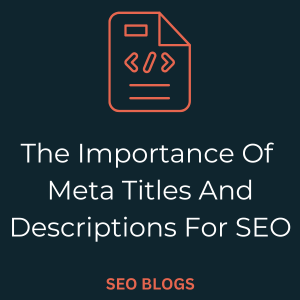Metadata – that stuff that makes up the bulk of what we see when scrolling the SERPS. Is it still important? How long should a meta title be? Is there such a thing as metadata optimisation? What does this all mean for SEO and, ultimately, my business’ sales?
These are questions that we’ll be tackling in today’s blog, which will run you through what meta titles and descriptions actually are, how to view and edit them and the impact they have on users and your SEO rankings.
But if you’re short on time, here are the key takeaways:
➡️ Spoiler, meta titles and descriptions are crucial for SEO! They help search engines understand your content and can significantly improve click-through rates
➡️ Search engines won’t always use the metadata you provide, but to make sure they do, ensure they meet the suggested character lengths, and accurately reflect precisely what’s on the page
➡️ You can optimise meta data, and you should! Target the right keywords, create a sense of urgency, and remember to always make each tag unique
Firstly, what are meta titles and descriptions?
Meta data is the snippets of text that appear in search engine results pages – in simple terms, what users read and click on to be taken to your website. As a result, they’re pretty important – first impressions count and they play a crucial role in how users perceive your site (and how likely they are to visit it).
So, let’s begin with the meta title. This is like a headline, or title, for your page. Displayed in bold font, it’s the first thing users will see. It’s also important for the search engines who use it to understand your page.
Then, the meta description appears just below the meta title; it’s a brief overview of what the page is about and can significantly improve CTR by grabbing users’ interest.
As you can see in the screenshot below, the meta description is the section beginning ‘protect yourself from the sun…’, whilst the blue text above is the meta title.
These days, search engines are very sophisticated, considering a wide spectrum of factors when ranking websites, and metadata is just one of them. But whilst not as important for ranking as it once was, this doesn’t mean your titles and descriptions don’t matter. A lot of people underestimate their importance but they do in fact still have a huge role in SEO. But why is that….
Why is metadata so important for SEO?
As we discussed above, metadata increases your click-through rate by providing an engaging summary of what your page offers. It allows users to make an informed decision about whether to click on your link, and often will include action words like ‘free delivery’ or ‘shop now’ to spark interest. So, why does this matter to you? Because the more clicks, the more traffic and potential customers!
High CTR is great not only for your conversions but also because it signals to Google that your page is valuable. Whilst there is no explicit confirmation that it directly affects search rankings, a consistently high CTR for a specific keyword might suggest to Google that your page is particularly relevant for that search term. Equally, a lower CTR is a red flag for Google, indicating that the content on your page isn’t matching user intent.
But that’s not all – meta titles and descriptions can boost your organic visibility because of keywords. Including the right, relevant terms in your metadata helps signal to search engines that your page is addressing these topics. It’s essentially a blueprint for the algorithms, giving them that extra bit of help needed to understand and rank your content.
How long should a meta description and meta title be?
It’s important not to get too carried away in your meta tags – keep them short, sweet and to the point, otherwise they’ll be cut short!
Whilst meta descriptions can technically be any length, Google tends to snip them short between 155 and 160 characters. This advice is given by Google:
It’s best to keep meta descriptions long enough that they’re sufficiently descriptive, so we recommend descriptions between 50 and 160 characters.
So, there’s your answer – but what about meta titles? Here, you’ve got less room to play with. Meta titles have a maximum length of just 60 characters and it’s generally agreed that the ideal length is between 50 and 60.
Do search engines always use your meta descriptions?
No; I’m afraid that search engines can ultimately use whatever they see fit for your description. They prioritise providing the most relevant information to users, so, in some cases, this might mean generating their own title and description for your page.
You can avoid this happening by making sure that what you write is well-aligned both with the user’s search query, and the content on the page itself. Otherwise, Google will simply create a more fitting description for you.
How to optimise your meta titles and descriptions
In light of this, you may now be asking the valid question, “how can I make my metadata better?” Here are our tips and tricks to write tags your copywriter would be jealous of:
💻Make your titles and descriptions super relevant. They need to be tailored carefully to the specific content on each page, so avoid using the same generic description across your entire site.
💻In fact, avoid duplicate content all together as this could get your pages penalised by search engines. It may be far less hassle to use identical meta titles across your website, but creating unique titles for each page will avoid this penalty.
💻Target the right keywords, but incorporate them naturally. Carry out in-depth keyword research to make sure you’re going for the most relevant terms, but remember the main aim of the tags is to tell readers what your page is about – not to see how many times you can fit ‘dog food’ into 60 characters.
💻Don’t just describe your content. Highlight its benefits and use these tags to clearly communicate what the users have to gain by clicking on your link. It can be good to incorporate a bit of urgency in the copy and there are a number of ways you can do this:
-> Time-sensitive language like ‘ends tonight’ or ‘limited-time offer’
->Use of action verbs, ‘start your free trial now’, ‘unlock your discount today!’
->Use of numbers – e.g. ‘only 10 spots left!’
->Using the seasons to say something like ‘last chance for summer deals’
So, the bottom line is, meta titles and meta descriptions do matter. They’re far more than just a button for users to click – optimised right, they’ll give a substantial boost to your site traffic, and help you rank for those important keywords.
If thinking of 30 different ways to say ‘shop now’ isn’t your strong point, why not leave it to the experts. Cedarwood Digital is an award-winning SEO agency, who’ll handle all the ins and outs of your SEO strategy, letting you focus on your business. If this sounds right up your alley, drop us a message at [email protected].

